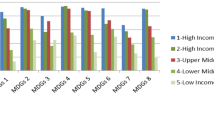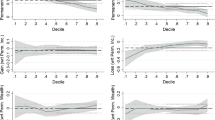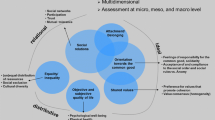Abstract
Can governance impact directly on well-being? In this paper we examine subjective well-being using data for a cross section of countries from the World Values data set. We find that regional democratic satisfaction impacts on both individual happiness and life satisfaction. However, the impact is less evident for women, rich people and for those in rich countries. The fact that the governance variable analysis is based on regional differences in democratic satisfaction reminds us that governance and indeed happiness often differs within countries as well as between them. The use of regional satisfaction in this manner helps overcome endogeneity problems which would be present if we were to use individual democratic satisfaction. Other significant determinants of happiness include settlement size, marital status, income, unemployment and being part of a linguistic minority/majority grouping.


Similar content being viewed by others
Notes
Using data from the World Values Survey.
At 1997 prices.
Certain key variables are not included in the fifth wave. These include democratic satisfaction.
We include country fixed effects, hence the impact of religion is related to the individual rather than on the culture of the country.
References
Alvarez-Diaz, A., Gonzalez, L., & Radcliff, B. (2010). The politics of happiness: on the political determinants of quality of life in the American states. Journal of Politics, 72, 894–905.
Bohnke, P. (2008). Does Society matter? Life satisfaction in the enlarged Europe. Social Indicators Research, 87, 189–210.
Bonini, A. N. (2008). Cross-national variation in individual life satisfaction: Effects of national wealth, human development, and environmental conditions. Social Indicators Research, 87, 223–236.
Bruni, L., & Stanca, L. (2008). Watching alone: Relational goods, television and happiness. Journal of Economics Behavior and Organization, 65, 506–528.
Caporale, G. M., Georgellis, Y., Tsitsianis, N., & Yin, Y. P. (2009). Income and happiness across Europe: Do reference values matter? Journal of Economic Psychology, 30, 42–51.
Clark, A. E., & Oswald, A. J. (1994). Unhappiness and unemployment. Economic Journal, 104, 648–659.
Clark, A. E., Oswald, A. J., & Warr, P. (1996). Is job satisfaction U-shaped in age? Journal of Occupational and Organizational Psychology, 69, 57–81.
Cullis, J., Hudson, J., & Jones, P. (2011). A different rationale for redistribution: Pursuit of happiness in the European Union. Journal of Happiness Studies, 12, 323–341.
Deaton, A. (2008). Income, health and well being around the world: Evidence from the Gallup World Poll. Journal of Economic Perspectives., 22, 53–72.
Di Tella, R., MacCulloch, J., & Oswald, A. J. (2001). Preferences over inflation and unemployment: Evidence of surveys of happiness. American Economic Review, 91, 335–341.
Di Tella, R., MacCulloch, J., & Oswald, A. J. (2003). The macroeconomics of happiness. Review of Economics and Statistics, 85, 809–827.
Diener, E., Gohm, C. L., Suh, E. M., & Oishi, S. (2000). Similarity of the relations between marital status and subjective well-being across cultures. Journal of Cross Cultural Psychology, 31, 419–436.
Dolan, P., Peasgood, T., & White, M. (2008). Do we really know what makes us happy? A review of the economic literature on the factors associated with subjective well-being, Journal of Economic Psychology, 29, 94–122.
Dorn, D., Fischer, J. A. V., Kirchgassner, G., & Sousa-Poza, A. (2007). Is it culture or democracy? The impact of democracy and culture on happiness, Social Indicators Research, 82, 505–526.
Dorn, D., Fischer, J. A. V., Kirchgassner, G., & Sousa-Poza, A. (2008). Direct democracy and life satisfaction revisited: New evidence for Switzerland. Journal of Happiness Studies, 9, 227–255.
Easterlin, R. A. (2001). Income and happiness: Towards a unified theory. Economic Journal, 111, 465–484.
Fahey, T., & Smyth, E. (2004). Do subjective indicators measure welfare? Evidence from 33 European societies. European Societies, 6, 5–27.
Ferriss, A. L. (2002). Religion and the quality of life. Journal of Happiness Studies, 3, 199–215.
Fiorina, M. P. (1976). The voting decision: Instrumental decision and expressive aspects. Journal of Politics, 21, 601–625.
Fosu, A., Bates, R., & Hoeffler, A. (2006). Institutions, governance and economic development in Africa: An overview. Journal of African Economies, 15(Supplement 1), 1–9.
Frey, B. S., & Stutzer, A. (2000). Happiness, economy and institutions. Economic Journal, 110, 918–938.
Frey, B. S., & Stutzer, A. (2002a). Happiness and Economics: How the Economy and Institutions Affect Human Well-Being. Princeton: Princeton University Press.
Frey, B. S., & Stutzer, A. (2002b). What can economists learn from happiness research? Journal of Economic Literature, 40, 402–435.
Gitmex, A. S., & Morcol, G. (1994). Socio-economic status and life satisfaction in Turkey. Social Indicators Research, 31, 77–98.
Graham, C., & Pettinatio, S. (2001). Happiness, markets, and democracy: Latin America in comparative perspective. Journal of Happiness Studies, 2, 237–268.
Guiso, L., Sapienza, P., & Zingales, L. (2008). Alfred Marshall lecture—Social capital as good culture. Journal of the European Economic Association, 6, 295–320.
Hayo, B., & Seifert, W. (2003). Subjective well-being in Eastern Europe. Journal of Economic Psychology, 24, 329–348.
Helliwell, J. F., & Huang, H. F. (2008). How’s your government? International evidence linking good government and well-being. British Journal of Political Science, 38, 595–619.
Henderson, J. (1985). Economic theory and the cities. Orlando, FL: Academic Press.
Hudson, J. (2006). Institutional trust and subjective well being across the EU. Kyklos, 59, 43–62.
Inglehart, R. F. (1999). Trust, well-being and democracy. In M. E. Warren (Ed.), Democracy and trust (pp. 88–120). Cambridge, UK: Cambridge University Press.
Inglehart, R., Foa, R., Peterson, C., & Welzel, C. (2008). Development, freedom and rising happiness: A global perspective (1981–2007). Perspectives on Psychological Science, 3, 264–285.
Inglehart, R., & Klingemann, H. (2000). Genes, culture, democracy, and happiness. In E. Diener & E. M. Suh (Eds.), Culture and subjective well-being (pp. 165–183). Cambridge, London: MIT Press.
Kahneman, D., Diener, E., & Schwartz, N. (Eds.). (1999). Well-being: The foundation of hedonic psychology. New York: Russell Sage Foundation.
Layard, R. (2006). Happiness and Public Policy: A challenge to the profession. Economic Journal, 116, C24–C33.
Namazie, C., & Sanfey, P. (2001). Happiness in transition: The case of Kyrgyzstan. Review of Development Economics, 5, 392–405.
Owen, A. L., Videras, J., & Willemsen, C. (2008). Democracy, participation, and life satisfaction. Social Science Quarterly, 89, 987–1005.
Pittau, M. G., Zelli, R., & Gelman, A. (2010). Economic disparities and life satisfaction in European regions. Social Indicators Research, 96, 339–361.
Royuela, V., & Surinach, J. (2005). Constituents of quality of life and urban size. Social Indicators Research, 74, 549–572.
Sanfey, P., & Teksoz, U. (2007). Does transition make you happy? Economics of Transition, 15, 707–731.
Schyns, P. (1998). Crossnational differences in happiness: Economic and cultural factors explored. Social Indicators Research, 43, 3–26.
Selim, S. (2008). Life satisfaction and happiness in Turkey. Social Indicators Research, 87, 531–562.
Snoep, L. (2008). Religiousness and happiness in three nations: A research note. Journal of Happiness Studies, 9, 207–211.
Tesch-Romer, C., Motel-Klingebiel, A., & Tomasik, M. J. (2008). Gender differences in subjective well-being: Comparing societies with respect to gender equality. Social Indicators Research, 85, 329–349.
Tsou, M.-W., & Liu, J.-T. (2001). Happiness and domain satisfaction in Taiwan. Journal of Happiness Studies, 2, 269–288.
Veenhoven, R. (2000). Freedom and happiness: A comparative study in forty-four nations in the early 1990s. In E. Diener & M. Eunkook (Eds.), Culture and subjective well-being (pp. 257–288). Cambridge, Mass: MIT Press.
Vermunt, R., Spaans, E., & Zorge, F. (1989). Satisfaction, happiness and subjective well-being of Dutch students. Social Indicators Research, 21, 1–33.
Wagner, M., Schneider, F., & Halla, A. (2009). The quality of institutions and satisfaction with democracy in Western Europe: A panel analysis. European Journal of Political Economy, 25, 30–41.
Work, R. (2002). Overview of decentralisation worldwide: A stepping stone to improved governance and human development, paper presented at the 2nd International conference on decentralisation “Federalism: The future of decentralizing states?”, Organised by the UNDP, Manila, Philippines.
Author information
Authors and Affiliations
Corresponding author
Data Appendix: Variable Definitions
Data Appendix: Variable Definitions
1.1 Attitudinal Variables
- Happiness:
-
A dependent variable; coded 1 if the individual responded that taking all things together they were not at all happy to 4 very happy
- Life satisfaction:
-
A second dependent variable; scaled from dissatisfied (1) to satisfied (10)
- Democratic satisfaction:
-
Coded 1 if the respondent is very dissatisfied satisfied with the way democracy is developing in their country to 4 (very satisfied)
1.2 Socio Economic Variables
- Male:
-
Binary variable, coded 1 if the respondent is a man
- Age:
-
Age of the respondent in years
- Married:
-
Binary variable, coded 1 if the respondent is married
- Widow:
-
Binary variable, coded 1 if the respondent is widowed
- Children:
-
Binary variable, coded 1 if the respondent has children
- Education:
-
Coded from 1 (no formal education) to 9 (university level education with degree)
- Income:
-
Coded from 1 to 10 reflecting increasing levels of household income—the exact classification varies from country to country. In effect this is a relative income measure
- Savings:
-
Coded 1 if the respondent’s family saved money in the previous year to 4 if they spent savings and borrowed money
- Poor health:
-
The self-perceived state of the individual’s health. A Binary variable, coded 1 if in poor or very poor health
- Unemployed:
-
Binary variable, coded 1 if the respondent is unemployed
- Location:
-
Coded 1–8 (large city) reflecting the size of the settlement in which the individual lives
- Religious Group:
-
Binary variables, coded 1 if the individual identified themselves as members of a religious group (Catholic, Protestant, Orthodox, Jew, Muslim, respectively)
- Linguistic Minority:
-
The proportion of the country’s population having as their first language the same as the respondent, where first language is defined as the one normally spoken at home
- Religious Minority:
-
The proportion of the country’s population having the same religion as the respondent
- GDPPC:
-
The level of GDP per capita in the individual’s country in the year 2000 in US$ purchasing power parity (Source: World Bank data set)
Countries included: Albania, Argentina, Bangladesh, Bosnia, Canada, Chile, Egypt, India, Indonesia, Iran, Japan, Jordan, Kyrgyz, Macedonia, Mexico, Moldova, Montenegro, Morocco, Peru, Philippines, Puerto Rico, Serbia, South Africa, Spain, Tanzania, Uganda, USA, Vietnam,




